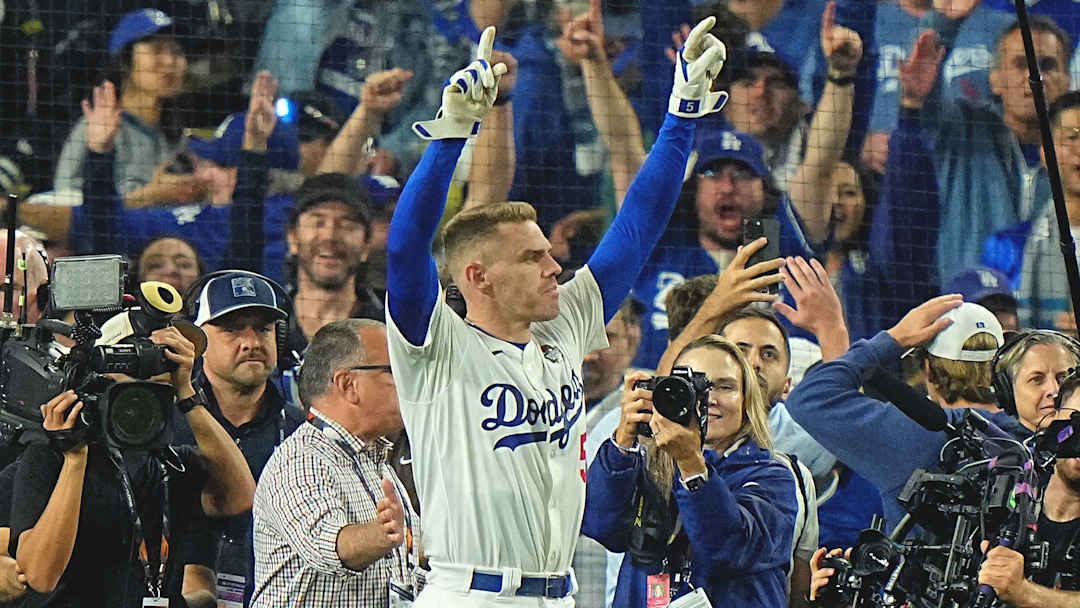Freddie Freeman’s Insistence On Playing Through Injury Pays Off
The Dodgers’ star first baseman has lobbied to stay in the lineup since being hobbled last month by a sprained ankle. Friday’s walk-off grand slam validated his confidence.
As the ball soared toward the stands, as the Los Angeles Dodgers poured out of their dugout and spilled onto the field, most of the sellout crowd of 52,394 had to be thinking about Kirk Gibson. Another hobbled lefthanded slugger, defying common sense and biology, limping to the plate and ending Game 1 of a World Series with a walk-off home run to right field to bring L.A. three wins from the title.
But as he danced around the bases, Freddie Freeman, the owner of the first walk-off grand slam in World Series history, the scoreboard flashing DODGERS 6, YANKEES 3, was thinking about his dad.
He’s been throwing me batting practice since I can remember,” he says. “My swing is because of him. My approach is because of him. I am who I am because of him.” So after he greeted his teammates at home plate, he made his way to the stands, where he found his father in the front row. “If he didn’t love the game of baseball, I wouldn’t be here playing this game,” Freddie says. “So that’s Fred Freeman’s moment right there.”
As for the Gibson comparison—the other most dramatic walk-off in L.A. history, when Gibson, in 1988, fighting a torn tendon in his left leg and a torn ligament in his right, entered as a pinch hitter in the ninth inning and blasted a two-run shot—Freeman just grins.
“I played the whole game, though,” he says.
SELBE: World Series Game 1 Takeaways: Freddie Freeman Pens Hollywood Sequel
If indeed the most important ability is availability, Freeman’s October should put him in the Hall of Fame. He badly sprained his right ankle trying to avoid a tag at first base on Sept. 26, and he has spent the intervening month hobbling from the training table to the infield and back. Doctors suggested he take four to six weeks off. He took eight days. He has missed only three playoff games. He spends hours getting treatment every day, barely making it to the hitters’ meeting. His teammates alternate between drawing inspiration from his grit and wincing every time he does.
“The game honors you,” says manager Dave Roberts. “When you do things the right way, you play the right way, you’re a good teammate—I just believe that the game honors you. Tonight Freddie was honored.
Sometimes that insistence on playing the game the right way drives them crazy, though. On Friday, for example, the only people more annoyed than the Yankees when New York left fielder Alex Verdugo misplayed a Freeman grounder were the Dodgers. There was Freeman, legging out a triple. “We’re all, like, ‘Oh no, Verdugo, you should have cut that off!’” recalls Dodgers center fielder Kiké Hernández. “Stop him at first or at second!’”
Says Roberts, “I was happy he came out of it upright.”
Hernández says he is actually glad the Dodgers lost twice in the National League Championship Series to the New York Mets, because a five-game series would have moved up the start of the World Series. Instead they bought themselves three extra days. “The off days were huge [for Freeman],” he says.
Freeman had not run in a week until he jogged out for introductions before Game 1, but he had begun to feel better two or three days earlier, when he and hitting coach Robert Van Scoyoc noticed that he could finally generate power from the ground again. “It’s how he transfers pressure on the inside part of his foot,” Van Scoyoc explains. “He was avoiding that.”
When Freeman was at his worst—late in the NLCS—he was barely able to swing the bat at all. Before Friday, he had not had an extra-base hit since the injury, and he hit .167 in the NLCS. Roberts acknowledged before Game 6 of that series that “you could argue” that Freeman’s insistence on playing was beginning to hurt the team. “But I could also argue that him doing whatever he can to be on the field and to post, I think, speaks loudly in that clubhouse,” Roberts added. For his part, Freeman says that he was unaware of the criticism and does not agree with it.
But he began lining the ball to left field during batting practice this week, and he knew he was back, or close to it
The Yankees were less sure. In the bottom of the 10th, after having taken a 3–2 lead in the top half of the frame, New York reliever Jake Cousins allowed a one-out walk and then a single to bring Shohei Ohtani to the plate. Manager Aaron Boone summoned lefthanded starter Nestor Cortés, who had been out since Sept. 18 with a strained flexor tendon. Ohtani was 2-for-12 against Cortés. “I don't know if you ever love a matchup against Ohtani, but I felt like Nestor could give us a shot at it,” Boone says. Cortés did retire Ohtani on a foul pop to Verdugo, but when the runners advanced to second and third base, leaving first open, Boone elected to walk the righthanded Mookie Betts and go after Freeman.
“We all thought that Shohei was gonna end it,” says Hernández. “It would have been a fairy tale ending to his first World Series game, but the fact that Freddie was the one that did it—even better.”
Freeman says he understood the decision. Roberts said he watched his first baseman take it personally. “I think he did, and I think he should,” he says. “They’re competitors, and that’s the way it should be
Fre-ddie, Fre-ddie,” the fans chanted. Out in the bullpen, the Dodgers relievers got goosebumps. Freeman decided to look inside—so he could avoid the cutter and the slider—and wait for a fastball. He didn’t have to wait long: First pitch, 93 mph, in and at his knees. He knew it was gone immediately. And as he jogged around the bases, for the first time in a month, his ankle didn’t hurt at all







